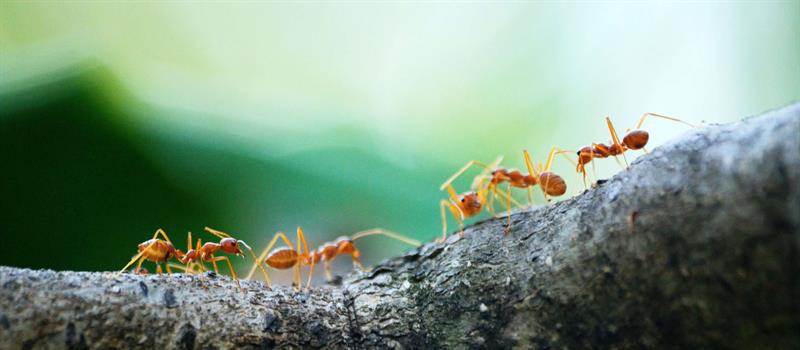Why Do I Get Ants When It Rains?
Posted by Mosquito Squad
February 24, 2023

We all know the saying about April showers, but did you know there's a secret second verse? "April showers bring May flowers, but lots of rain drive ants insane!" As we move out of winter and into spring, greater rainfall means ants are on the move from your lawn into your home.
How does wet weather affect ants?
Ants and fire ants are proficient at building nests. Using their powerful mandibles, or "ant jaws," ants breakup soil and plow through the earth to form tunnels and chambers for their colony. Some ant hills are obvious, like fire ant hills which look like big mounds of loose dirt in your lawn.
Other ants, like black garden ants, leave little trace of their mounds. Instead, their nests are often made with deep networks of tunnels. Many species of ants don't stop at one ant hill. Satellite nests are additional mounds formed by ant colonies to either host queens or brood or to serve as additional space for the colony to expand to.
Thanks to their complex architecture, light showers and sprinkles of rain do little to disrupt ant hills. Typically, small amounts of water can run through the channels and tunnels without pooling, and once the water soaks into the earth, life in the colony resumes as usual.
However, when heavy rainstorms lead to flooding and over-saturated ground soil, ants are often flushed out of their nests and forced to seek shelter elsewhere. And what better place to go and escape the rain than in your home!
How can I get ahead of an ant problem?
For ants, it's best to be proactive in control efforts to prevent an invasion. Though it's tempting to remove every single ant you see on sight, it's often less effective to squash them one by one than it is to ant-proof your home. Consider these tips when assessing your home for ant entryways:
-
Check that house openings, such as front doors, screen doors, and windows, have tight seals when closed.
-
Address any cracks and unwanted crevices in the walls and outdoor foundation of your home.
-
Survey your lawn for ant mounds formed around your property.
What kinds of ants should I look out for?
Not all ants build mounds, but the ones that do are the ones likely to surge your house after a storm. Be on the lookout for the following ants in and around your home:
Pavement Ants
Pavement ants are the most common ants you'll see wandering inside. Introduced from Europe, pavement ants are dark brown and black and form colonies under pavement, rocks, and cement slabs. To prevent pavement ants from establishing near your home:
-
Look for small clusters of dirt with a hole in the center formed on top of or near stone and pavement.
-
Check the placement of decorative stones in proximity to your house.
-
Store cinder blocks, large rocks, and other pavement-like debris inside your garage or in a shed away from your home.
Fire Ants
Fire ants are aggressive, stinging ants best known for their reddish coloration and agitating bites. Fire ants may come in your home after rainy weather, but they will not build their nests inside. There are many species of fire ants throughout the United States, including the Red Imported Fire Ants (RIFA). As fire ant mounds can be built year-round, be sure to check your lawn for signs of fire ants nests:
-
Are ant mounds present around your lawn?
-
Do the mounds look like loosely packed soil?
-
Have you seen dark red ants wandering about your yard?
*To learn more about Mosquito Squad's fire ant control, click here.
With proper upkeep of your yard and the perimeter of your house, you can avoid ants marching one by one into your home! And if backyard pests outnumber you, contact your local Mosquito Squad today!
